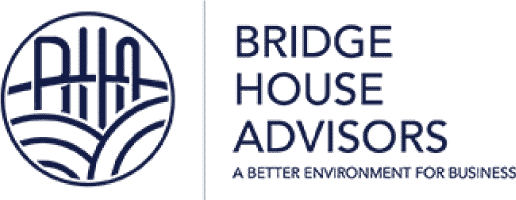EHS/Sustainability actions are usually motivated by large, strategic customers and regulatory compliance requirements. Our clients must do these activities to mitigate risk like avoiding fines or retaining business. Bridge House Advisors also develops and implements sustainability strategies that companies should do to reduce cost and enhance revenue. These strategies are not aspirational. Rather they focus on true value add on a realistic time horizon. Compliance and value creation. The best of both worlds.

Environmental Compliance Health & Safety
Emergency Planning & Community Right-to-Know Act Reporting (Tier II / Form R)
Bridge House works with company representatives to evaluate hazardous material storage and reportable chemical usage for each portfolio company facility to determine if reporting is required. Bridge House also prepares the reports for submittal to the appropriate agencies.
RECENT HIGHLIGHTS
- Bridge House utilized automated data collection to determine hazardous material storage at over 20 data centers, and prepared and submitted Tier II reports for all facilities within one week of the Tier II reporting deadline.
- Bridge House personnel have evaluated applicability and completed numerous Form Rs for manufacturing clients, including metal parts manufacturing, plating operations, mining, food manufacturing, etc.
Stormwater & Wastewater Permitting, Reporting, and Sampling
Bridge House assists companies with stormwater and wastewater compliance. For stormwater, Bridge House first works with each facility to identify any industrial materials / processes that may come into contact with stormwater to identify opportunities for providing coverage from precipitation or relocation of these materials to eliminate the requirement for coverage under general industrial stormwater permitting. When relocation or the covering of materials is not possible, Bridge House assists the company to obtain coverage under the appropriate industrial permit and prepares Stormwater Pollution Prevention Plans that apply practical Best Management Practices and streamline compliance requirements. Wastewater services include preparation of permit applications, negotiation of permit conditions, wastewater sampling, and preparation of Discharge Monitoring Reports.
RECENT HIGHLIGHTS
- Bridge House negotiated permit monitoring requirements for a data center client and was able to decrease surcharges by $30,000 to $45,000 per year. Bridge House routinely samples the wastewater and prepares monthly, quarterly, and semiannual reports for submittal to the local treatment works.
- In order to streamline regulatory requirements, Bridge House prepared Integrated Compliance Plans that incorporated the requirements of stormwater permitting and Spill Prevention, Control, and Countermeasure Plans for a portfolio of wastewater pre-treatment facilities. The Integrated Compliance Plans provided the tools and guidance to maintain compliance on an ongoing basis, while also meeting all regulatory requirements.
Spill Prevention, Control, and Countermeasure Planning
Bridge House prepares and, where required, certifies Spill Prevention, Control, and Countermeasure (SPCC) Plans. The Plans incorporate best management practices and practical solutions for secondary containment and ongoing compliance requirements, where possible.
RECENT HIGHLIGHTS
- In order to streamline regulatory requirements, Bridge House prepared Integrated Compliance Plans that incorporated the requirements of stormwater permitting and SPCC Plans for a portfolio of wastewater pre-treatment facilities. The Integrated Compliance Plans provided the tools and guidance to maintain compliance on an ongoing basis, while also meeting all regulatory requirements.
- Bridge House provided professional engineering certifications for several complex drivetrain remanufacturing facilities, including a site inspection, and review and draft of updated SPCC plans. Bridge House’s feedback brought the plans into compliance, as well as simplified requirements, where possible.
Air Permitting, Monitoring, & Reporting
Bridge House evaluates air permitting applicability for manufacturing and commercial operations, including emission inventories and regulatory reviews. Permit applications are followed through the agency review process in order for Bridge House to assist in negotiating permit conditions. Bridge House will provide compliance tools, such as monthly and rolling emissions calculators, and assist with periodic reporting, including emission inventories and compliance certifications.
RECENT HIGHLIGHTS
- Bridge House assisted a manufacturing client by auditing its existing facilities and obtained minor source permits for adhesive/coating processes; solvent, caulk, and glue usage; and cutting/sawing of various materials at a newly constructed facility. Bridge House completed an emissions inventory, evaluated regulatory applicability, prepared the permit application, and negotiated with the agency to obtain permits with reasonable conditions for recordkeeping and monitoring. Bridge House was successful in expediting the permit process and received final permits two months prior to the agency deadline, which even included application modifications during the review process.
- After the Chicagoland area’s attainment classification changed, Bridge House evaluated the emissions for eight large emergency generators and prepared a permit application for a Federally Enforceable State Operating Permit, instead of a Title V permits as indicated by the agency. On an ongoing basis, Bridge House provides emission tracking tools for use by facility personnel and prepares annual emission inventories for the facility.
Regulated Waste Management Programming
Bridge House assists industrial and commercial clients with developing waste management programs addressing all waste streams, including solid, hazardous, and universal wastes. Bridge House conducts waste characterizations, generator status determinations, and develops and implements waste management programs, including development of hazardous waste contingency plans, throughout client portfolios.
RECENT HIGHLIGHTS
- Bridge House assisted an industrial wastewater treatment facility by obtaining a new hazardous waste treatment permit after sale of the business to a new owner, including development of a new contingency plan and quick reference guide.
Health & Safety Program Development
In completing due diligence, many small and mid-sized portfolio companies have addressed OSHA compliance in a reactive manner, as injuries have occurred. Bridge House works with these companies to develop health and safety programs that are applicable to their operations and provide a practical and OSHA compliant approach to compliance that can easily evolve with changing or growing operations.
RECENT HIGHLIGHTS
- Bridge House prepared a Health & Safety Program for an electronics manufacturer to provide job-specific hazard assessments, personal protective equipment requirements, and hazard communication information. The program was supplemented with training materials for use by facility supervisors.
Health & Safety Training
Bridge House works with its clients’ existing Health & Safety programs or those developed by Bridge House to create company-specific training programs that meet the regulatory requirements and address the company’s operations. In addition to the programs, Bridge House provides tools for tracking employee training and ensuring ongoing compliance.
RECENT HIGHLIGHTS
- Bridge House prepared a Health & Safety Program for an electronics manufacturer to provide job-specific hazard assessments, personal protective equipment requirements, and hazard communication information. The program was supplemented with training materials for use by facility supervisors.
Safety Culture Transformation
Bridge House works closely with clients to evaluate current health and safety programs and performance in order to identify gaps in overall safety culture of the business and identify approaches to improving and reinforcing a strong safety culture. While Bridge House provides tools and recommendations for how the company can make improvements, it is the clients’ leadership teams that have to drive the change in culture and as this occurs, Bridge House evaluates the changes and performance in order document improvement through key performance indicators.

Sustainability & Climate Change
Corporate Sustainability Strategy & Reporting
Bridge House provides sustainability strategy development and reporting services for global clients across a variety of sectors. This includes engaging stakeholders, conducting materiality and double materiality assessments (as required by the European Union standards), developing strategic platforms / pillars for a sustainability program, recommending initiatives through a robust road mapping exercise, establishing performance metrics, and setting long-term goals. Specific to reporting, our services include developing comprehensive sustainability reports using reputable frameworks, such as the Global Reporting Initiative (GRI) and Sustainability Accounting Standards Board (SASB) Standards. We also support the preparation of formal responses to various third-party sustainability disclosures.
RECENT HIGHLIGHTS
- Supported various clients through the CDP reporting process, with the submissions due in September. As part of those engagements, we draft responses, perform mock scorings, and support with the uploads to the CDP Platform.
- Developed a sustainability strategy framework and roadmap for a company in the healthcare sector through a sustainability asset / initiatives review, a materiality assessment, and an engagement with key stakeholders to identify long-term goals.
Corporate Sustainability Program Action Planning and Execution
After a strategy and roadmap are established, Bridge House specializes in robust program implementation, including supporting clients to execute actions. Our team serves clients in any capacity, from simply training or coaching on-site staff, to executing actions, to leading specific projects that fill resource gaps, to acting as an outsourced sustainability office that engages with a company’s internal teams on an ongoing basis. Bridge House models its program development using a management systems approach that ensures robust ESG-related policies, practices, and training that are focused on continuous improvement.
Climate Risk Assessments
Bridge House helps clients assess projected vulnerabilities to physical assets/facilities from climate-related hazards through physical climate-risk scenario modeling. By assessing physical climate risks, clients can proactively address vulnerabilities through operational adjustments and infrastructure upgrades to avoid direct damage to facilities, prolonged business interruptions, higher operating costs, and diminished asset values. Similarly, Bridge House can identify organizations with heightened transitional climate risks. By failing to keep up with policy changes, energy and economic transition, technology development, etc., fund managers may see lower returns if organizations are unable to shift towards low-carbon economy operations.
RECENT HIGHLIGHTS
- Bridge House conducted a TCFD-aligned Scenario Analysis for a fund with over 400 physical locations.
- Bridge House conducted a Facility Sustainability Assessment (a comprehensive report that couples a facility condition evaluation with physical climate risk analysis and energy performance analysis) for a portfolio of six manufacturing facilities identifying both physical risks for mitigation planning and annual utility savings of over $300,000.
Carbon Footprinting and Facility Diagnostics
Bridge House utilizes operational data to help our clients quantify their greenhouse gas (GHG) emissions as well as their energy usage across their investment portfolios. By conducting comprehensive carbon footprint assessments and energy diagnostics, Bridge House enables clients 1) visualize which portfolio companies are the largest emitters of carbon (i.e., largest consumers of energy/resources) and 2) respond to LP requests related to energy and carbon emissions.
RECENT HIGHLIGHTS
- Each year, Bridge House calculates over 150 carbon footprints for portfolio companies helping PE clients meet LP requests and/or align with reporting frameworks such as EDCI.
- Bridge House completed a life-cycle carbon analysis (carbon handprint) for a US-based recycling company, which focused on the GHG emissions avoided by the use or application of its recycled products compared to the GHG emissions associated with the manufacture of similar products made from virgin materials.
- Bridge House developed a decarbonization plan for a global manufacturing company with over 50 locations.
Energy Management & Resource Efficiency
Bridge House works with PE clients, beginning with simple energy data diagnostics, to help them understand cost savings potential and implement and manage programmatic energy/utility demand reduction across their portfolio companies. This work entails collecting and analyzing energy performance data, sizing the opportunity in financial terms, prioritizing companies and individual facilities that offer the best opportunities for fast savings, conducting onsite opportunity assessments, and providing oversight and support for the implementation of energy performance improvement initiatives driven by low-cost/no-cost operations and maintenance improvements.
RECENT HIGHLIGHTS
- Bridge House worked with a large cap PE firm to help them implement a Utility Demand Reduction program. Analysis of eight (8) portfolio companies in the fund, prioritized by a number of factors revealed the following upside: a conservative annual cost savings potential of $23M and a near-term (i.e., quick start) cost savings opportunities at six (6) of the companies worth $6.7M.
Waste Characterization, Minimization and Diversion
Many organizations have not revisited their waste hauling contracts for several years. Because of this, current contracts do not reflect the actual waste being generated by their operations. This often results in overcharges by the hauler in the form of excess equipment rentals and unnecessary hauls. Bridge House helps our clients to understand their charges, waste streams, and volumes so that contractors can be renegotiated with right-sized equipment, on-demand haul schedules, and optimization of waste streams can be implemented to reduce costs.

Revenue Enhancement
Customer/Stakeholder Engagement Support
PE sponsors, their portfolio companies, and other corporate clients have many stakeholders that are imposing a myriad of environmental, social, and governance requirements on their businesses. Bridge House helps to make sense of these mandates and supports our clients to quickly and efficiently build a program that delivers value to their customers while enhancing internal operational value. Bridge House’s support enables the company and its operators to focus on what they do best.
Voluntary Reporting Support
Many companies are receiving customer and/or investor requests to respond to third-party sustainability surveys or questionnaires. Bridge House has extensive experience annually supporting clients to navigate reporting mechanisms some of which include (but are not limited to) CDP, EcoVadis, and SBTi in order to effectively and accurately tell their ESG story while also maximizing results.
Impact Opportunity Assessment
Using a proprietary methodology, Bridge House evaluates the broader environmental and/or social impacts of a company’s business such that the company’s impact can be quantified in the form of an Impact Model and reported to both internal and external stakeholders.
RECENT HIGHLIGHTS
- Assessed the societal impacts of a women’s reproductive healthcare provider to quantify the improved healthcare outcomes and cost savings compared to the regional baseline of care in the company’s regional markets.
- Evaluated the environmental impacts of an industrial products service & repair business to quantify the avoided GHG emissions associated with service & repair versus sourcing brand new replacement products.
- Assessed the environmental impacts of a fiber optics network operator, comparing the energy efficiency, and associated carbon impacts, of growing fiber optic-based networks along with a phaseout of legacy copper-based networks.
- Assessed the societal impacts of a large-scale residential remediation project in terms of human health benefits and economic lift provided to the impacted community.

Liability Management
EHS Management Programs
As each company’s needs are different, Bridge House modifies its approach to EHS management program development to meet those specific needs. We evaluate EHS compliance requirements and identify those requirements which are best managed internally by company personnel, where target hiring by the company may be the best approach, and which requirements may be most effectively addressed by Bridge House’s subject matter experts. Bridge House then develops a training program for the company’s personnel to ensure an understanding of the regulatory intent, actual requirements, and compliance task specifics. For overall EHS document and task management, Bridge House works with the company to develop internal tools or provides an IT solution that fits the company’s needs.
RECENT HIGHLIGHTS
- Bridge House personnel have worked with portfolio companies to develop paths to environmental compliance for multi-facility industrial portfolio companies, including facility audits, resolution of identified compliance deficiencies, and comprehensive environmental compliance training for facility personnel to ensure ongoing compliance.
- Bridge House is currently working with a data center portfolio of over 60 locations to identify all compliance obligations through remote data collection, visiting a limited number of facilities, and conducting interviews with facility managers. With the information collected, Bridge House will develop a road map to compliance for all facilities and an IT-based solution to provide guidance on EHS regulations and requirements, and to serve as a tool for maintaining ongoing compliance going forward.
EHS Auditing
Bridge House is comprised of an experienced team of multi-media environmental compliance auditors who have conducted hundreds of audits throughout the United States in different industry sectors identifying both regulatory risk and management issues. Our team’s process includes a review of records, interviews with onsite staff, and physical observations of the facilities and operations. We believe in a team approach and actively engage employees at all levels within the client organization in order to provide guidance and help improve the overall EHS program throughout the organization.
RECENT HIGHLIGHTS
- Bridge House audited over 20 data center locations to determine current compliance with environmental, health, and safety regulations as part of a larger initiative to integrate a portfolio of over 60 locations and develop an EHS management program. The data collection process was automated to streamline on-site personnel efforts, efficiently complete site walk throughs, and develop audit findings. During the site visits, Bridge House collects all the necessary information that will be need to assist with corrective actions and works with site representatives to prepare or revise any required plans or reports.
- Bridge House conducted hybrid audits of ten aerospace part manufacturing and repair facilities, which included site visits to several facilities and modified ‘virtual’ audits for the remaining locations. The virtual audits included detailed questionnaires to collect needed documentation, pictures, and operational information. Additionally, Bridge House followed up with phone interviews to confirm site details and provide guidance on compliance requirements. The audit findings and recommended corrective actions were utilized by onsite staff to further their understanding of environmental regulations and improve ongoing compliance.
Site Liability Evaluation & Management
Bridge House assists clients with evaluating the potential liabilities associated with impacted sites and managing those liabilities through investigation and oversight of remediation. The value Bridge House brings to addressing contaminated property is not performing remediation but advising the client on the best approach to manage or mitigate the risks associated with contaminated property ownership. Bridge House continues its role as a technical advisor by assisting with investigation, overseeing remediation, and conducting ongoing liability or accrual evaluations.
RECENT HIGHLIGHTS
- Bridge House has evaluated site liabilities associated with the acquisition of several steel rolling portfolios, including facilities with significant soil and groundwater contamination and operations with Asset Retirement Obligations that posed a potential barrier to resale.
- Bridge House professionals provided technical oversight of third-party remediation consultants for an adhesive manufacturing company at several facilities throughout the United States. Evaluation and feedback on consultant approaches provided the client with significant cost savings.
Soil and Groundwater Investigations
Bridge House provides comprehensive subsurface and groundwater investigation services, focusing on understanding the risk and developing client-specific sampling plans to ensure solutions are identified. Bridge House professionals have conducted investigation and remediation at many commercial and industrial sites in order to obtain closure through state programs.
RECENT HIGHLIGHTS
- Bridge House has completed soil and groundwater site investigations at various manufacturing and commercial facilities to address current and historical operations, such as former underground storage tanks, chlorinated solvent use, and significant chemical usage. Investigation data has been used to negotiate transaction agreements and evaluate risks for ongoing operations.
Insurance Recovery
Prior to the mid-1980s, general business insurance policies did not exclude pollution liabilities. Companies with these policies have the opportunity to recover costs associated with known past and potential future site liability expenditures. In partnership with the company and a specialized law firm, Bridge House identifies known and potential site liabilities and evaluates the associated costs to obtain closure for the sites. The evaluation is then utilized as the basis for claims on these older insurance policies.
RECENT HIGHLIGHTS
- Bridge House professionals have assisted on cases that have recovered $6 to $10 million for companies in the energy, manufacturing, and airport industries.
Regulatory Reporting Support
As regulatory reporting now exceeds traditional EHS compliance and requires expertise in all areas of environmental, social, and governance, Bridge House has taken the opportunity to support clients to (a) identify ESG regulations that apply to their PE firm and/or company and (b) enable timely reporting in areas such as Extended Producer Responsibility (EPR), California Air Resources Board (CARB) compliance, California Supply Chain Act, Canadian Child and Forced Labor Act, the Sustainable Finance Disclosure Regulation (SFDR), and the Corporate Sustainability Reporting Directive (CSRD) as well as others.
As part of California’s evolving climate regulations, Senate Bill (SB) 261 requires companies to prepare climate-related financial disclosures. Bridge House partners with clients to develop these reports, detailing their approach to identifying, assessing, and managing climate-related risks and opportunities that may impact their operations. These disclosures not only support regulatory compliance but also help organizations strengthen resilience and transparency in the face of climate change.

